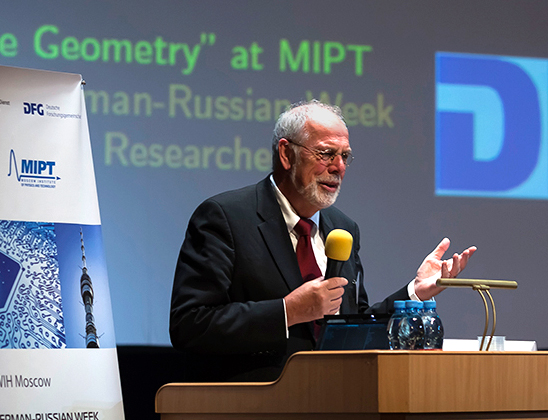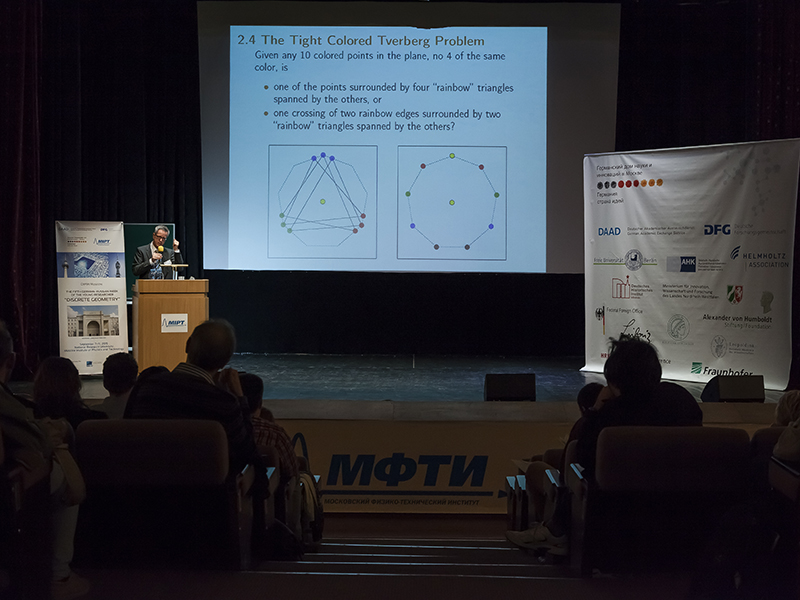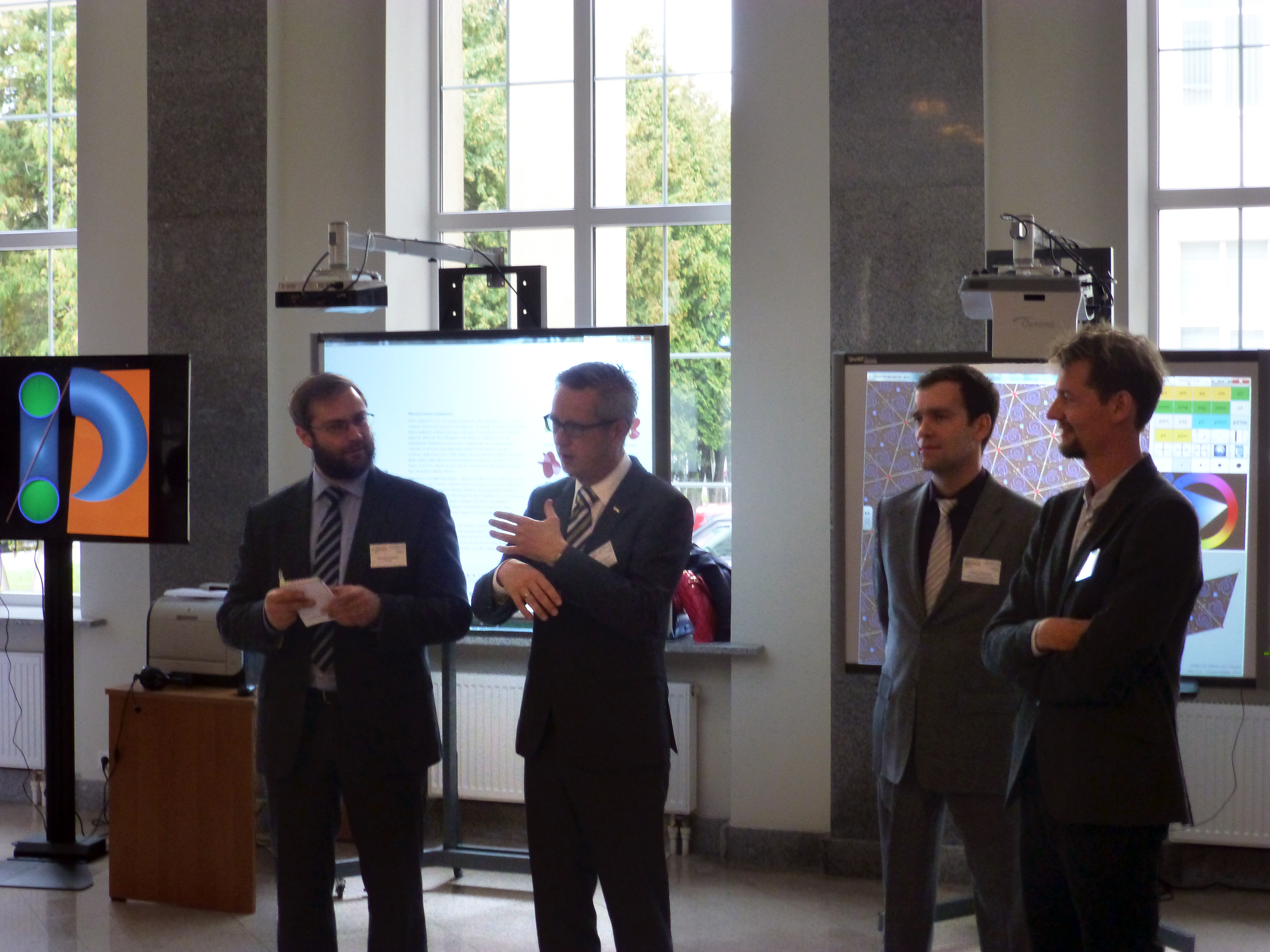Week of the Young Researcher for Mathematics at Moscow's MIPT

DFG Vice-President Professor Peter Funke welcomes participants to a week dedicated to young researchers at the Moscow Institute of Physics and Technology (MIPT)
© DFG
(29.09.15) In early September the German Academic Exchange Service (DAAD) and the Deutsche Forschungsgemeinschaft (DFG, German Research Foundation) organised the fifth German-Russian Week of the Young Researcher under the umbrella of the German House for Research and Innovation (DWIH Moscow). Over 80 doctoral and postdoctoral researchers and professors presented their research approaches in discrete geometry at the Moscow Institute of Physics and Technology (MIPT). The 25 German participants included DFG Vice-President Peter Funke (Münster), DFG Senator Günter M. Ziegler (Berlin) and Rector Peter Scharff (Technical University of Ilmenau).
For the formal opening of the week, approximately 100 German and Russian researchers and representatives of other universities, research institutions and funding organisations assembled in the great hall of the National Research University in the Moscow suburb of Dolgoprudny. Attendees were welcomed by the Rector of MIPT, Nikolay Kudryavtsev, who underlined the pre-eminent importance of collaboration with German universities to the internationalisation of his institution. Peter Funke, Vice-President of the DFG, and Peter Scharff, a member of the DAAD Executive Committee, both welcomed the participants on behalf of the German contingent. Mikhail Rusakov from the Department of Economic Affairs and Research at the German embassy in Moscow conveyed the congratulations of German ambassador Rüdiger Freiherr von Fritsch on what was already the fifth Young Researchers' Week in Russia.

Introductory address by Professor Günter M. Ziegler (member of the DFG Senate and chair of the Scientific Committee of MFO Oberwolfach)
© DFG
The opening address to the assembled company, which introduced the chosen topic of discrete geometry, was given by Leibniz Prize and Communicator Award winner Günter M. Ziegler from the Free University of Berlin. Professor Ziegler, a scientific member of the DFG Senate and chair of the Scientific Committee at the Mathematisches Forschungsinstitut Oberwolfach (MFO), together with curator Andreas Matt (MFO), then opened the exhibition "IMAGINARY - Through the Eyes of Mathematics". This interactive touring exhibition, designed in Oberwolfach, vividly illustrates the wide range of practical applications of discrete geometry and was open to guests during the Young Researcher Week at MIPT.

Opening of the IMAGINARY exhibition with Günter M. Ziegler, Andreas Matt (both MFO Oberwolfach) and Mikhail Rusakov (German embassy in Moscow)
© DFG
Throughout the week at MIPT, respected mathematicians from Germany, Russia and ten other countries introduced the various panels with introductory talks and moderated short presentations by the young researchers. Günter Ziegler (Berlin), Horst Martini (Technical University of Chemnitz), Carsten Schütt (Kiel) and other experienced university lecturers were able to give valuable advice to the early career researchers from Research Training Groups and other DFG funding programmes. The German participants, in particular, who this year hailed from Berlin, Bonn, Chemnitz, Heidelberg, Ilmenau, Kiel, Münster, Oberwolfach, Osnabrück and Rostock, also took advantage of the opportunity for in-depth discussion with the DFG delegation. In addition to Vice-President Peter Funke and Senator Günter M. Ziegler, the DFG was represented by Frank Kiefer, responsible programme director in the Mathematics, Physics and Geosciences division, Jürgen Breitkopf, programme director in the Research Careers division, and Jörn Achterberg, director of the DFG's Russia office.
The basic purpose of the Week of the Young Researcher conferences is to encourage wider networking and stronger partnerships among early career researchers. They incorporate interdisciplinary and forward-looking themes and key current issues in bilateral cooperation between Germany and Russia. In recent years they have focused on topics in the life sciences, natural sciences, engineering sciences and humanities. This year, issues from the field of mathematics were in the spotlight. Another new feature in this year's programme was a workshop organised by the Springer publishing house on academic publishing, which gave young researchers an insight into the entire publication process, from the preparation to the publication of research results.
The Young Researcher Weeks were set up in 2011 as an initiative of the DAAD and DFG as part of the German-Russian Year of Science, Education and Innovation. Held once a year at changing locations in Russia, they aim to address current issues through international cooperation. The events are organised in partnership with leading Russian universities and research centres. After Kazan (2011), Yekaterinburg (2012), Novosibirsk (2013) and St. Petersburg (2014), this year's host was MIPT Moscow.
The Moscow Institute of Physics and Technology was founded in 1946 at the instigation of the Soviet Academy of Sciences with the support of leading figures such as Nobel Prize winners Pyotr Kapitsa, Nikolay Semyonov and Lev Landau. It quickly became one of the country's elite schools of science, and nowadays it is especially well known for the 'Phystech System' – a special teaching and training system for early career researchers. MIPT's many famous alumni include the winners of the 2010 Nobel Prize for Physics, Andrey Geim and Konstantin Novoselov. With approximately 6000 students, MIPT is today considered one of the top universities in Russia, especially for physics, mathematics and informatics. In 2009 MIPT was accorded the status of a National Research University, making it one of a select circle of 'Leading Universities of the Russian Federation'.